
Need a technical assessment tool, but don’t know which one to choose?
Today, you’ll discover the 30 best coding assessment tools that will help you identify and hire the right candidates and build a world-class technical team.
Want to learn more? Read on!
How to choose your coding assessment tool
First things first:
How do you choose the right tool?
A great developer assessment tool will help you identify the best candidates who are a perfect fit for your team.
That’s why it’s so important that you first choose the right type of assessment tool. Here’s what you need to know.
What type of assessment tool should you choose?
Not all assessment tools are equally good at helping you identify the best tech talent.
Let me explain:
You might know that companies like Google and Facebook are known to use screening questions and whiteboarding challenges in their technical hiring processes.
But using screening tests and tools isn’t the best way to filter your candidates.
In fact, studies show that these challenges are downright bad for technical hiring. People perform worse when they feel stressed and you don’t get a realistic and truthful view of someone’s skills.
In other words:
You might end up hiring the wrong person.
And that can be costly. The cost of a bad hire can be 30% of that person’s first-year salary.
This is why take-home coding assignments are a far better way to assess developer skills. Fortunately, there are some great take-home coding challenge tools out there (which we’ll look at shortly).
Take-home coding challenges let developers perform their tests at home and ideally, in their own development environment.
The idea is to get a good understanding of how developers would perform on the job. This is a completely different assessment approach than asking developers to solve brainteasers. (Which only helps you understand how quick someone is on their feet in stressful situations or how prepared they are for the interview, not their actual coding abilities.)
Ultimately, take-home coding challenges help you hire the best developers. This also means that they help you hire a more diverse team because candidates get to demonstrate their real-life skills and you reduce the risk of biased hiring decisions.
What to look for in a coding assessment tool
So, what should you look for in a coding assessment tool? Good question. Here are the features that are a must-have for well-executed coding challenges:
- Ease of process. How easy is it to set up and run your coding challenges?
- Candidate experience. Does the challenge create a great experience for candidates (even those you end up rejecting)?
- Own challenges. Does the platform let you upload your own challenges?
- Supported languages/frameworks. How many/which languages and frameworks does the platform support and are these languages/frameworks the ones you need?
- Number of applicants. How many applicants can go through a challenge? (This usually depends on the subscription level you sign up for, but the tool you choose should make it possible for you to go up to a level where you can assess however many applicants you need.)
- Number of seats for your team. Does the tool make it easy for your reviewers to review challenges and how many can collaborate simultaneously?
- Flexibility/customizability. Does the tool make it possible to customize parts of the process according to your needs?
- Support. What type of support do you get and how fast?
- Scalability. Is the tool scalable for when your team grows?
- Plagiarism detection. Does the tool make it possible to detect plagiarism? (However, the tool shouldn’t make this an intimidating experience but instead, effectively weed out plagiarism.)
- Cost-effectiveness. Does the tool offer more value than what you pay for it?
- Improved time-to-hire. Does the tool make it faster to hire new developers to your team?
For example, here’s what Aimee, Engineering Mentoring Program Lead, from Babbel said about their hiring criteria before the team started working with us:
“It took a lot of research before deciding on a platform to use for administering the Neos code challenges. We obviously had a bit of a unique scenario, thus the main criteria was flexibility, specifically on the below points:
- Deciding on our own coding challenges
- The languages the challenges will be available in
- The number of applicants
- The number of reviewers from Babbel
- Pricing
Flexible subscriptionCodeSubmit stood out in all of the above. The feedback that we received from the candidates about their experience was overwhelmingly positive - specifically regarding the ease of the process, as well as the personal and engaging experience the process offered.”
Of course, this depends on YOUR needs and requirements.
For some teams, the defining criterion might be flexibility and for others, that the tool supports the right people on the team (such as non-technical hiring managers).
Start by defining your criteria.
And when you’re done, take a look at the 20 tools here below.
The 30 best coding assessment tools
What are the best coding assessment tools? Here below is one of the most comprehensive comparisons of leading technical assessment platforms. These tools work for teams and companies of different sizes -- from small businesses to big multi corporations.
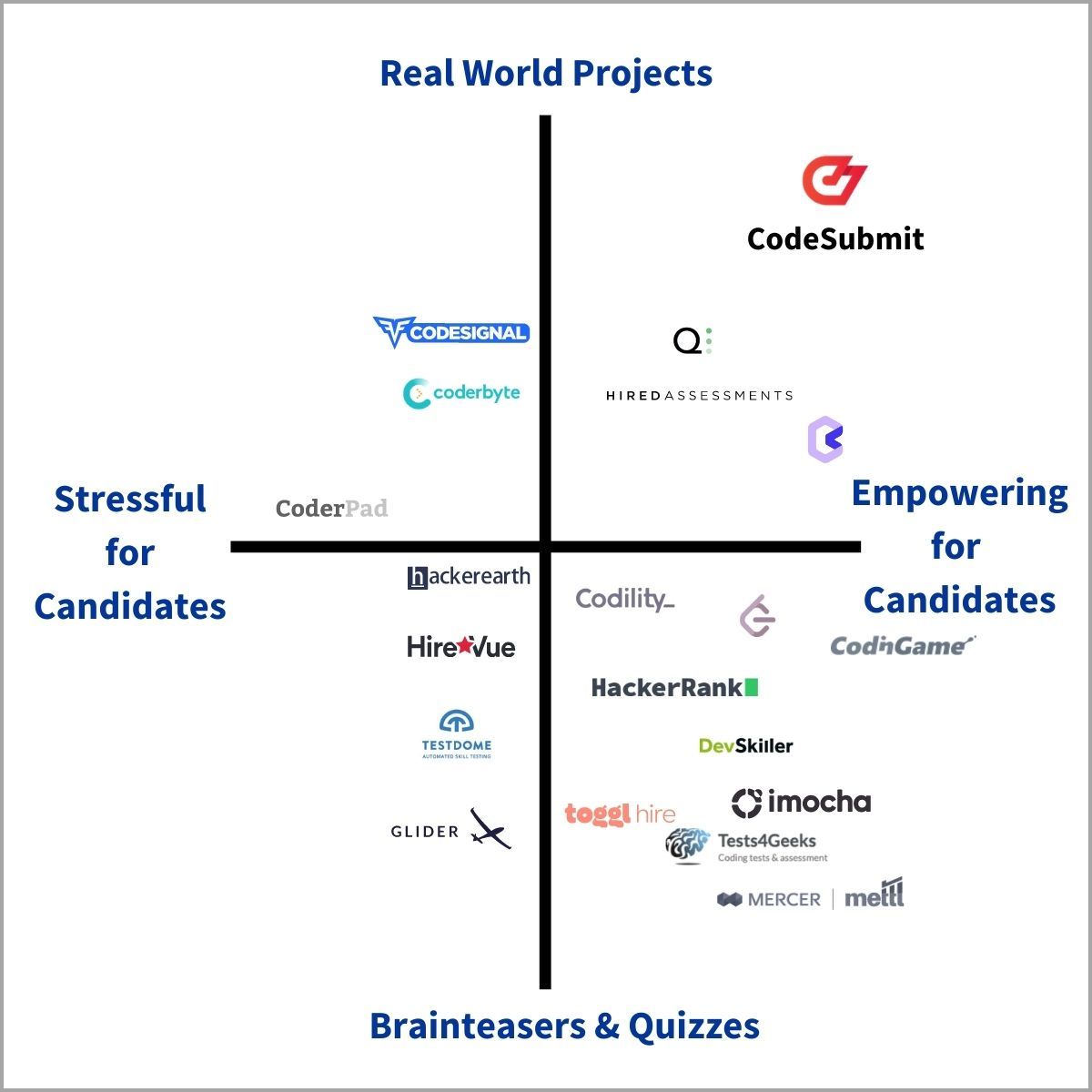
Read on to see which assessment platform works best for your needs.
1. CodeSubmit
Founded: 2019
Free trial: Yes
CodeSubmit is the most flexible and candidate-friendly solution for administering and evaluating coding assignments and technical interviews on the market today. Built to replace later stage in-person interviews like whiteboarding and live-programming, CodeSubmit allows you to identify great candidates using real tasks in the form of a take-home assignment.
Everything about the platform is designed to provide strong signals and insights into your candidate’s real skill set while maintaining the best candidate experience possible.
CodeSubmit is the only platform that allows you to test candidates’ framework knowledge, and the CodeSubmit library currently includes over 50 of the most popular languages, frameworks and technologies used by frontend, backend and mobile teams worldwide.
Who is it for?
- Small businesses and startups who want to consistently attract and hire the best developers while providing an excellent candidate experience.
- Large teams and enterprises who are ready to adopt remote and asynchronous processes in lieu of whiteboarding or live-coding while ensuring that they always identify the best candidates in their talent pool.
Pros
- Lets you create coding assignments specific to each open position. Every assignment contains evaluation criteria related to the work your engineers face in their day-to-day. All assessments are fully customizable to your engineering team’s stack. You can also upload your own coding assignment.
- Supports 50+ languages and frameworks. (This makes CodeSubmit one of the most comprehensive tools.)
- Offers real-time updates as your candidates progress through the CodeSubmit journey. Be on top of your hiring game without leaving your existing tools.
- Helps you effectively detect plagiarism and quickly filter out misuse.
- Focuses on the candidate experience to help you attract the best talent and build your employer brand.
- Flexible monthly and annual pricing for small and large teams alike.
Cons
- CodeSubmit specializes in remote and asynchronous take-home projects to replace in-person technical interviews. While their library does include shorter automated screening tests (CodeSubmit Bytes), it may not be the best tool for high-vollumn early-stage candidate screening.
2. HackerRank
Founded: 2012
Free trial: Yes
HackerRank is one of the biggest technical interview platforms and also offers a skill development tool for developers. Originally founded in 2009 in Bangalore, HackerRank offers a customizable platform for technical teams. The company offers online technical assessments, real-time code-pair sessions, and take-home challenges.
Who is it for?
- Corporations and multinationals that need a robust and compliance-friendly system. Many of HackerRank’s customers include big banks.
Pros
- Various assessment options (for teams that need both screening and assessment tools).
- Enterprise-level features (advanced integrations and security).
Cons
- Prices start at $249/month, billed annually which can be on the higher end for smaller teams.
- HackerRank isn’t specialized in one assessment tool type, ie. this isn’t necessarily a highly tailored tool if you’re looking for a certain type of assessment (like take-home coding challenges).
3. Devskiller
Founded: 2013
Free trial: Yes
Devskiller is a tech sourcing, skill mapping, and screening tool based on the company’s RealLifeTesting™ methodology. With the tool, you can both interview and screen candidates. Devskiller makes it easy to customize tasks and you also get access to an API.
Who is it for?
- Companies with technical hiring teams that need to customize features instead of relying on done-for-you tools.
Pros
- A great tool for hands-on recruiters who want to access all the features they need in one tool and want the possibility to custom-build their own features.
Cons
- The tool isn’t ideal for less technical hiring teams or teams that want a solution that is simpler to manage.
- For teams that need less customization, pricing is on the higher end (monthly rates start at $399, billed annually)
4. HackerEarth
Founded: 2012
Free trial: Yes
HackerEarth was originally created as a platform for corporate hackathons. Since then, it’s added code screening and pair programming interview functions. As a screening platform, HackerEarth serves companies that want to filter candidates early on in the process, rather than identify the best candidates.
Who is it for?
- Companies that have the “champagne problem” of too many qualified candidates and need to screen candidates quickly. These are mainly companies with enterprise needs.
Pros
- A platform that makes it easy to get started (you don’t need to talk to sales).
- Robust tools to fight plagiarism.
- The platform allows you to both run hackathons and screen candidates.
Cons
- Many of the plagiarism-fighting features can repel candidates because they make tests feel like whiteboarding tests (eg. recording candidates while they’re working through the test).
- This is not the most robust tool for assessing candidates’ actual skills and identifying the right candidates.
5. HireVue
Founded: 2004
Free trial: No
HireVue is one of the bigger assessment platforms. It offers video interviewing, assessments, and interview scheduling functions. While HireVue isn’t solely focused on developer recruiting, it does offer technical assessments.
Who is it for?
- Teams that need a tool with more capabilities than just assessments and that have the capacity to work with a non-specialized tool.
Pros
- Strong reference customers, including Unilever and Dow Jones.
- Includes a video interview process for those companies that want to reduce the number of phone screens.
Cons
- This is not a platform that specializes in technical assessments, even if the platform includes these types of tools.
- Candidates can feel intimidated by the video interview features.
6. Qualified
Founded: 2016
Free trial: Yes
Qualified is a developer-friendly developer skill assessment platform. This tool lets you test skills with multi-file, language-specific online coding tests that developers complete in their own development environment. Customers include Apple and GE. The founders are the creators of Codewars, a code challenge platform for skills development.
Who is it for?
- Companies that need a simple, but effective way to assess technical talent and that don’t have a lot of requirements for the languages and frameworks they assess. For example, smaller startups or teams hiring for certain developer roles.
Pros
- The platform offers blind reviews, which can help you build a more diverse team.
- Also offers pair-programming interviews and code playback features that make it easy to review developers’ thought-process.
Cons
- Qualified only supports 28 languages, which is on the lower end for most coding assessment platforms.
7. Codility
Founded: 2009
Free trial: Yes
Codility is a skill-testing platform that offers screening and interviewing functionalities. It’s somewhat similar to HackerRank, but at a lower price point. The platform counts Tesla and Microsoft as its users.
Who is it for?
- Enterprise-level organizations that need robust compliance features and teams with less tech-savvy hiring managers.
Pros
- Codility offers compliance features that can be helpful to enterprise-level organizations.
- The platform includes features that make it easy to compare programmers’ skills, so it’s ideal for non-technical hiring managers.
Cons
- For teams with true coding skill assessment needs, Codility’s screening tests might not be enough.
- Users report that candidates aren’t always graded properly, which might lead to overlooking qualified candidates.
8. CodeSignal
Founded: 2014
Free trial: Yes
CodeSignal offers three products: Screening and real-time interviewing tools, as well as Certify, a proctored coding assessment test. This platform also includes tools for developers to practice their skills.
Who is it for?
- Fast-growing companies that need to scale their hiring efforts quickly.
Pros
- Certify can help make more data-driven hiring decisions, as hiring teams need to rely less on resumes and more on actual skills from the start.
- A sleek UI, which makes it easier to set up tests and invite candidates.
Cons
- Some of the plagiarism detection features can repel clients from completing the challenge (for example, video recordings).
9. CoderByte
Founded: 2018
Free trial: Yes
CoderByte offers a platform with three different functionalities: screening, interviewing, and take-home challenges. The customizable platform allows hiring teams to manage different stages of the hiring process in one place. CoderByte offers many integrations and customization options, which makes it a good choice for teams with very specific needs.
Who is it for?
- Companies that need a cost-effective tool that allows them to manage different hiring process stages in one platform.
Pros
- One of the cheapest options available, with unlimited assessments for all plans.
- Advanced customizability and options for integrations.
Cons
- Users and candidates report that the experience is sometimes not optimal.
- Take-home challenges don’t support that many languages (18).
10. CoderPad
Founded: 2013
Free trial: Yes
CoderPad offers a live programming environment with both live interview features and a new take-home challenge offering. Hiring teams can use CoderPad’s challenges or use their own. CoderPad also comes with some integration options.
Who is it for?
- Companies planning on using live assessments but who are also maybe interested in take-homes.
Pros
- CoderPad offers one of the cheaper take-home options, as its subscriptions start at $50. This grants personal access to one user.
Cons
- Supports approximately 30 languages and frameworks, which means that some teams might not be able to use this tool for their assessment needs.
- Take-home offering is in the fledgling stages and not fully realized.
11. Byteboard
Founded: 2019
Free trial: No
Byteboard is a relatively new tool that focuses heavily on helping enterprise companies create diverse teams. The company is founded by Google’s own in-house incubator, Area 120. Byteboard is currently available for mobile, web, backend engineering, and data engineering roles.
Who is it for?
- Enterprise teams that want to level up their hiring processes when it comes to diverse hiring.
Pros
- Byteboard offers an end-to-end solution, which makes it ideal for teams that need more hands-on support.
- Advanced tools for diverse hiring, such as anonymization features.
Cons
- Byteboard only supports nine languages, which can make it very challenging for many teams to use this tool.
12. CodinGame
Founded: 2012
Free trial: Yes
CodinGame provides a platform for coding skill tests, as well as games for developers to help them practice their skills. As the platform is created by former video game designers, it takes a slightly different approach to developer hiring. Developers can develop their skills with fun games and employers can create engaging tests that take 60 seconds to set up. You also get access to challenges that aim to retain talent.
Who is it for?
- Companies that are looking to engage and retain talent.
Pros
- CodinGames engages a pool of developers through their skill practice solution. You can tap into that talent pool to fill your hiring pipeline.
- The platform takes a slightly different, fun approach to coding assessments. This can help you create a more engaging employer brand.
Cons
- If you need a more robust assessment tool, CodinGame’s tech skill tests might not be enough and you’ll need a different tool to create an advanced hiring process.
- Some users have said that the assessments are not close enough to real work to provide a good indicator of skill.
13. TestDome
Founded: 2013
Free trial: Yes
TestDome is a technical skill assessment platform for various industries, including programming, accounting, and customer service. Many of its skills tests are more general (rather than focused on a specific coding skill) and assess skills like sales and reasoning.
Who is it for?
- Companies that are looking to screen candidates, don’t need a robust skill assessment, and don’t have a lot of requirements for their tests.
Pros
- Pay-as-you-go pricing that can be advantageous to teams that don’t want to sign up for a subscription.
Cons
- Not a niche solution, which means that the platform might not cater to all the needs of technical hiring teams.
- Only supports 10+ languages/frameworks.
- Plagiarism detection can be intimidating to candidates (for example, the platform’s webcam monitoring feature).
14. Toggl Hire
Founded: 2017
Free trial: Yes
Toggl Hire is a simple screening solution for developer hiring and allows you to “go from 500 applicants to the 50 strongest candidates in one afternoon.”
Who is it for?
- Enterprise companies who have hundreds of candidates and want to narrow down the top 10%.
Pros
- Easily filters candidates by scores and tags.
- Integrates with the most popular ATS.
- Offers a public API.
Cons
- Currently only supports 30 languages.
- Skills tests are more like quizzes and do not resemble real world projects.
15. Hired Assessments (Formerly Py)
Founded: 2012
Free trial: No
Py, a Y Combinator-backed company, was acquired by Hired in 2019 and rebranded as Hired Assessments. Through the acquisition, Hired, a marketplace that matches recruiters with tech talent, expanded its offerings to include tools for hiring processes.
Who is it for?
- A good tool for companies that are looking to diversify their assessments.
Pros
- Three options to choose from: challenges (coding quizzes and challenges for screening), projects to simulate real-world problems, and live challenges that let you interview candidates in a live code environment.
Cons
- Hired supports 16 languages, which is fewer than many other developer skill test tools.
16. Imocha (Interview Mocha)
Founded: 2012
Free trial: No
Imocha, or Interview Mocha as it was previously known, offers 2,000+ ready-made skill tests and a robust enterprise-ready platform. The platform offers live interviewing and skill assessment features.
Who is it for?
- SMBs and enterprises that need a well-managed skills library.
Pros
- Robust enterprise-level features.
- An extensive skills library.
Cons
- Imocha supports 20+ coding languages, so even though the tool comes with a skills library, it might not work for every hiring team’s needs.
17. Mercer Mettl
Founded: 2009
Free trial: Yes
Mercer Mettl offers different features for technical hiring teams, including an online coding interview platform, an online hackathon platform, and a role-based simulator. The focus is more on screening and interviewing candidates than later-stage assessments.
Who is it for?
- Companies that need to screen and filter candidates, ie. larger companies that receive plenty of applications.
Pros
- An extensive repository of 100,000+ technical questions for 300+ skills.
- An end-to-end platform for screening and interviewing candidates.
Cons
- If your hiring team is looking for skill assessment later on in the process, Mettl doesn’t offer a robust take-home project solution.
18. LeetCode
Founded: 2015
Free trial: No
LeetCode is a San Francisco-based startup that focuses primarily on helping software developers enhance their skills and prepare for technical interviews. The company also offers some features for helping businesses assess candidates.
Who is it for?
- Companies that need to expand their pool of candidates and want to tap into LeetCode’s database of developers.
Pros
- A talent pool of candidates using LeetCode to prepare for interviews.
Cons
- If you’re specifically looking for a skill assessment tool, this one is not likely to send you the strongest signals.
19. Tests4Geeks
Founded: 2013
Free trial: Yes
Test4Geeks is an assessment tool that offers a library of tests, as well as the possibility for users to create their own tests. The tests are mostly quiz-like and the company positions itself more in the screening process.
Who is it for?
- Test4Geeks is ideal for companies that want to screen candidates and need a relatively affordable and simple tool.
Pros
- Simple to use and doesn’t come with unnecessary features.
Cons
- If you’re looking for more robust and customizable assessment features, this tool might not be the best fit.
20. GLIDERai
Founded: 2015
Free trial: Yes
GLIDER.ai is a screening tool for various roles (including tech, operations, sales, and marketing). The tool uses interactive question types and simulations for real-world tasks. The focus is on screening candidates, rather than skills assessments.
Who is it for?
- Companies that want to focus on screening and need a tool for more than tech roles.
Pros
- A screening platform that is simple to use.
Cons
- Users report that the interface doesn’t always work as it should.
- If you’re looking for a more thorough assessment tool, this might not be the perfect fit.
21. Filtered.ai
Founded: 2018
Free trial: No
Filtered.ai offers “technical job simulations”, or short, comprehensive tasks that help to assess skills based on a company’s tech stack. This hiring tool is mainly created for bigger enterprise-level clients.
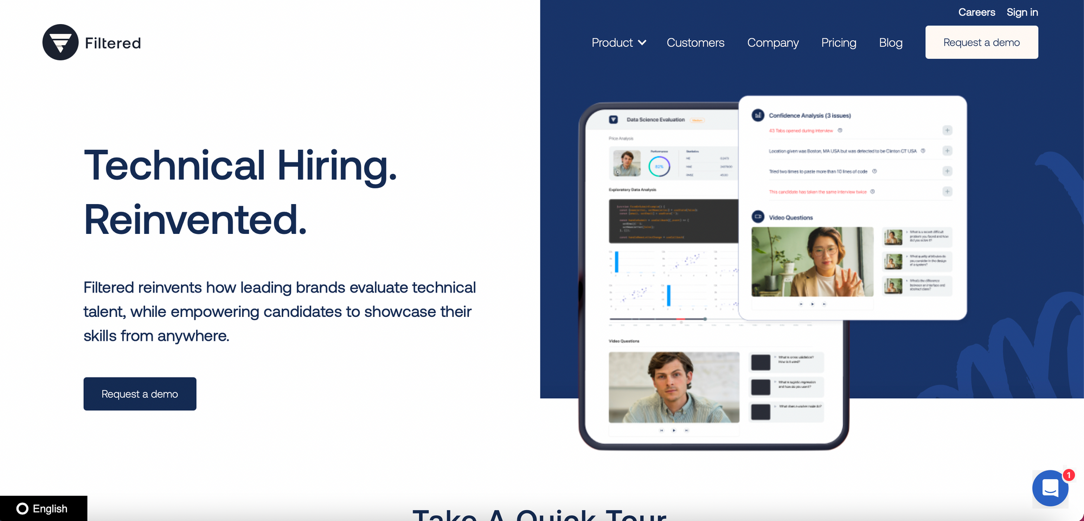
Who is it for?
- Filtered.ai has a plan for enterprises.
Pros
- A screening tool to make hiring simple.
Cons
- No options for smaller employers.
22. Sphere Engine
Founded: 2008
Free trial: Yes
Sphere Engine offers an API that enables companies to create flexible and scalable coding skills assessment solutions and code execution environments. Sphere Engine also has a “learn to code” environment for those who teach coding.
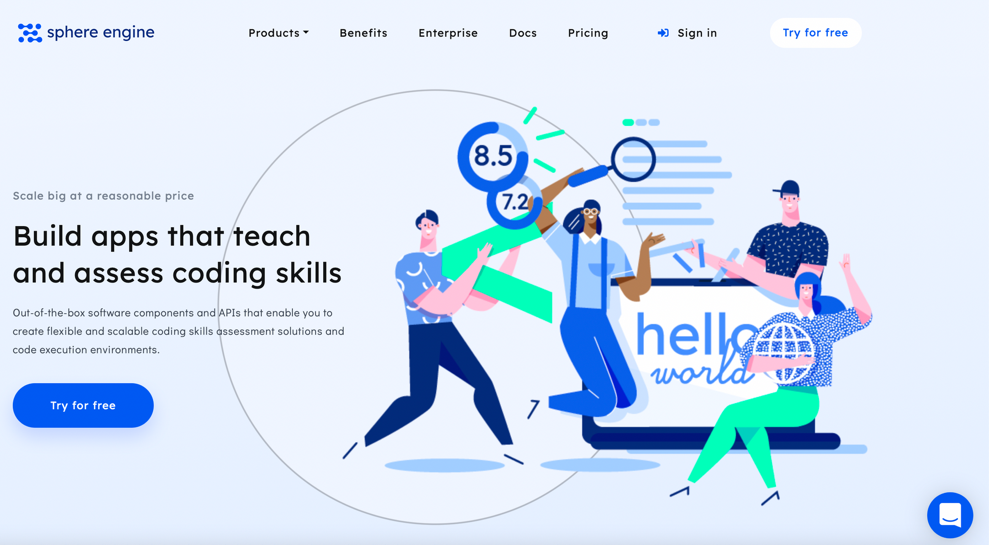
Who is it for?
- Sphere Engine is for companies of different sizes and also offers enterprise-level features.
Pros
- Supports several languages (80+).
Cons
- Requires more tailoring for time-strapped hiring managers.
23. Adaface
Founded: 2018
Free trial: Yes
Adaface offers different types of assessment tests (aptitude, psychometric, personality, and coding tests). Its coding tests are standardized 40-minute coding tests based on library tests.
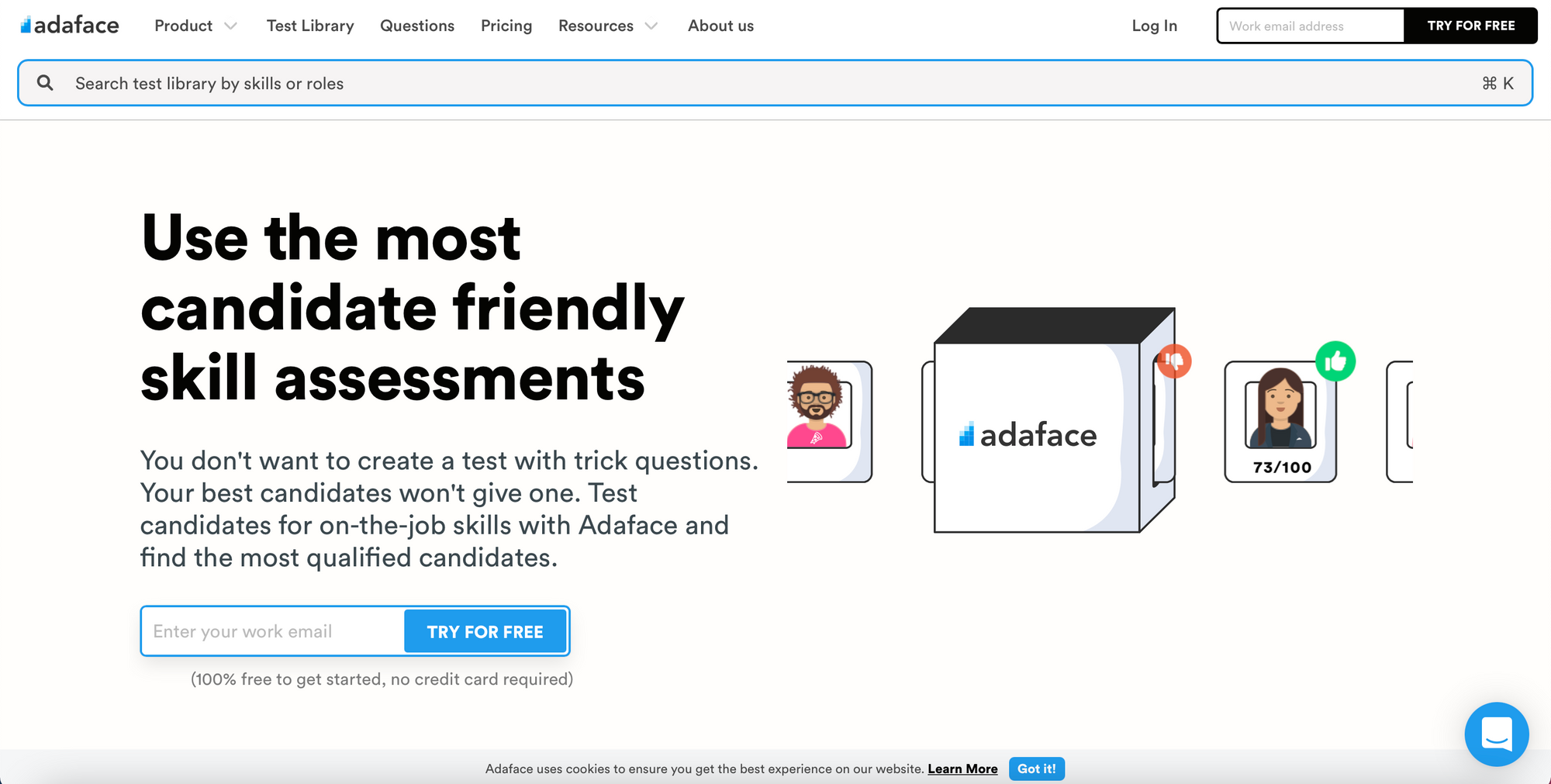
Who is it for?
- Adaface offers pricing plans across the spectrum, from individuals to enterprises.
Pros
- Robust library with 500+ tasks.
Cons
- Only one (40-minute) task option, which might not be sufficient for organizations that need flexibility.
24. Triplebyte
Founded: 2015
Free trial: Yes
Triplebyte was co-founded by a former Y Combinator partner. The company offers 30-minute technical assessments that teams use before interviewing candidates (sort of like screening questions). The tool is free for the first 500 users. Triplebyte also offers tools for sourcing and outreach.
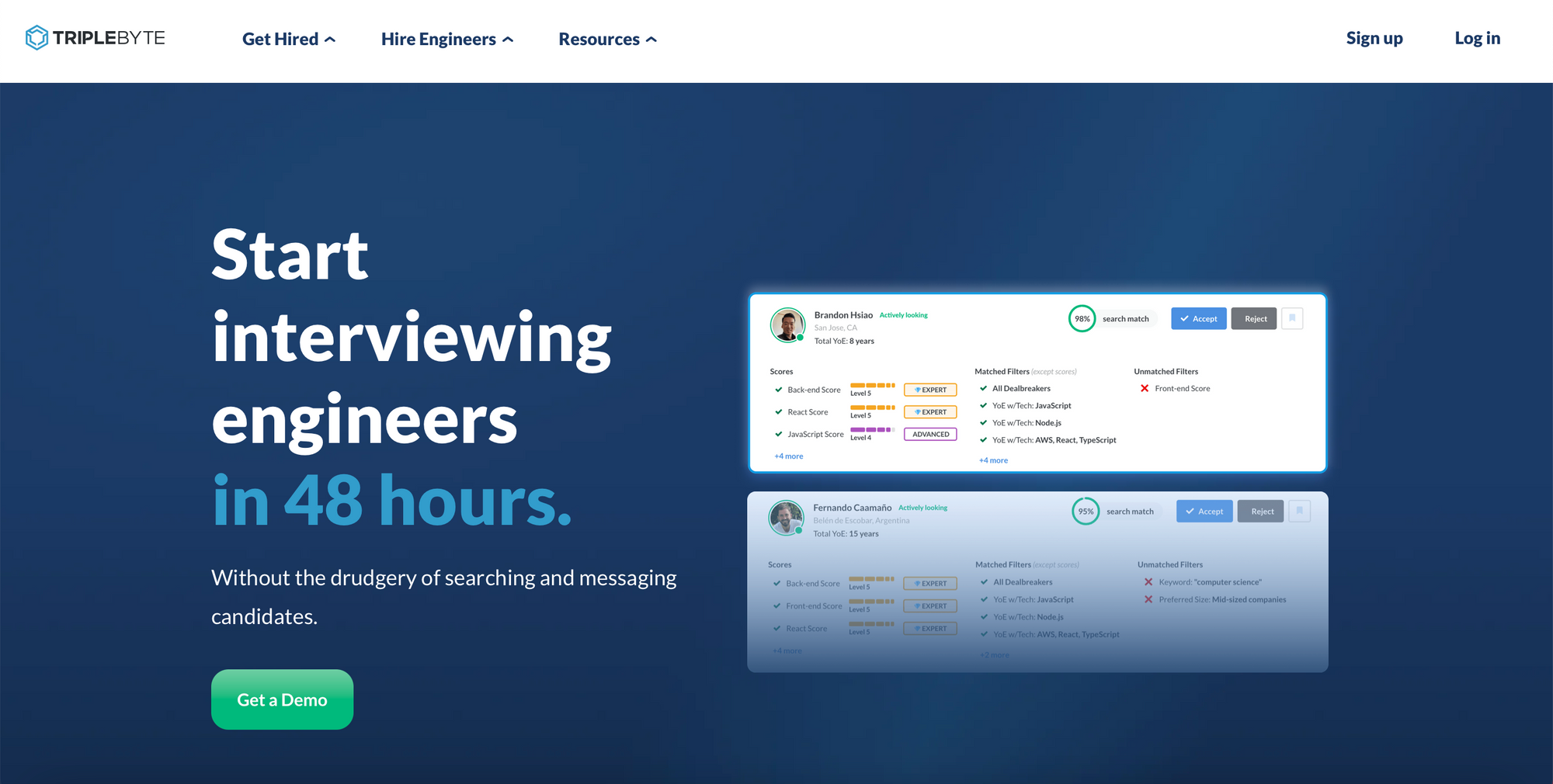
Who is it for?
- Triplebyte works for both small and big companies.
Pros
- Options to source and reach out to candidates make this a good 360 tool.
Cons
- If a company isn’t looking for a screening-type test, Triplebyte doesn’t offer other alternative plans.
- The tool includes limited specs for tailoring tests.
25. TestGorilla
Founded: 2020
Free trial: Yes
TestGorilla is a screening test tool that replaces resumes. It’s, in other words, not exactly a coding challenge tool, but offers a different approach to the early stages of the hiring process.

Who is it for?
- TestGorilla has pricing options for everyone from free users to businesses with occasional hiring needs, businesses that scale, and businesses with high-volume needs.
Pros
- A new approach to resumes.
Cons
- Not suitable for companies looking for late-stage coding challenges.
26. Vervoe
Founded: 2016
Free trial: Yes
Vervoe is an AI-powered skill-testing platform. The company offers an AI that grades candidate responses against a data set. Vervoe has options for small businesses, startups, and entrepreneurs. Vervoe isn’t a niched tool for developer hiring.
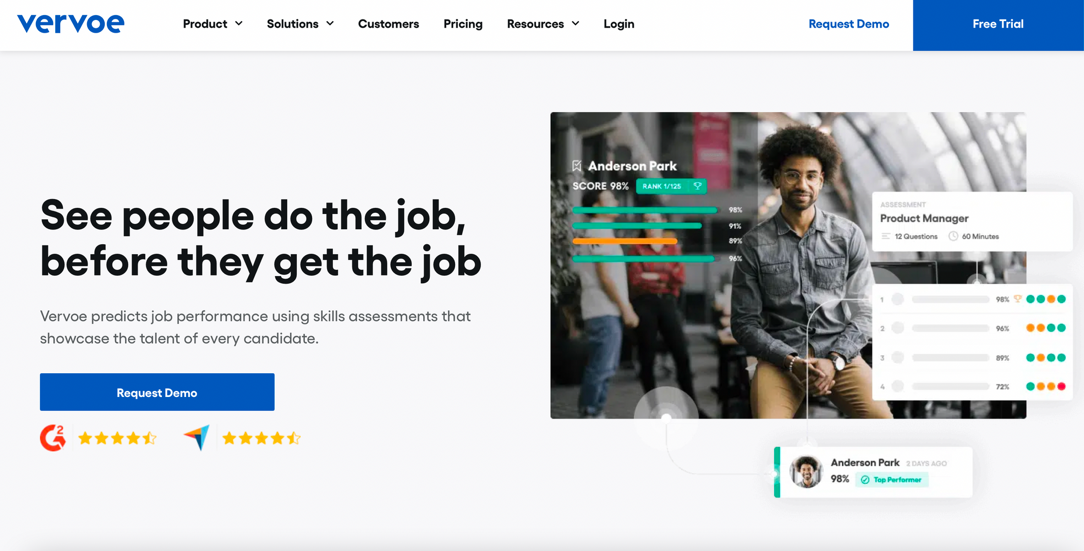
Who is it for?
- Vervoe works for various businesses, as it offers a pay-as-you-go plan, along with skills-based hiring and a skills validation plan.
Pros
- AI-based tool, which means that hiring gets easier the more you train your AI.
Cons
- Inflexible if you need a tool with different coding test options.
27. WeCP (We Create Problems)
Founded: 2016
Free trial: Yes
We Create Problems is a screening and interviewing platform. You’ll also get access to the company’s extensive talent pool for sourcing candidates.
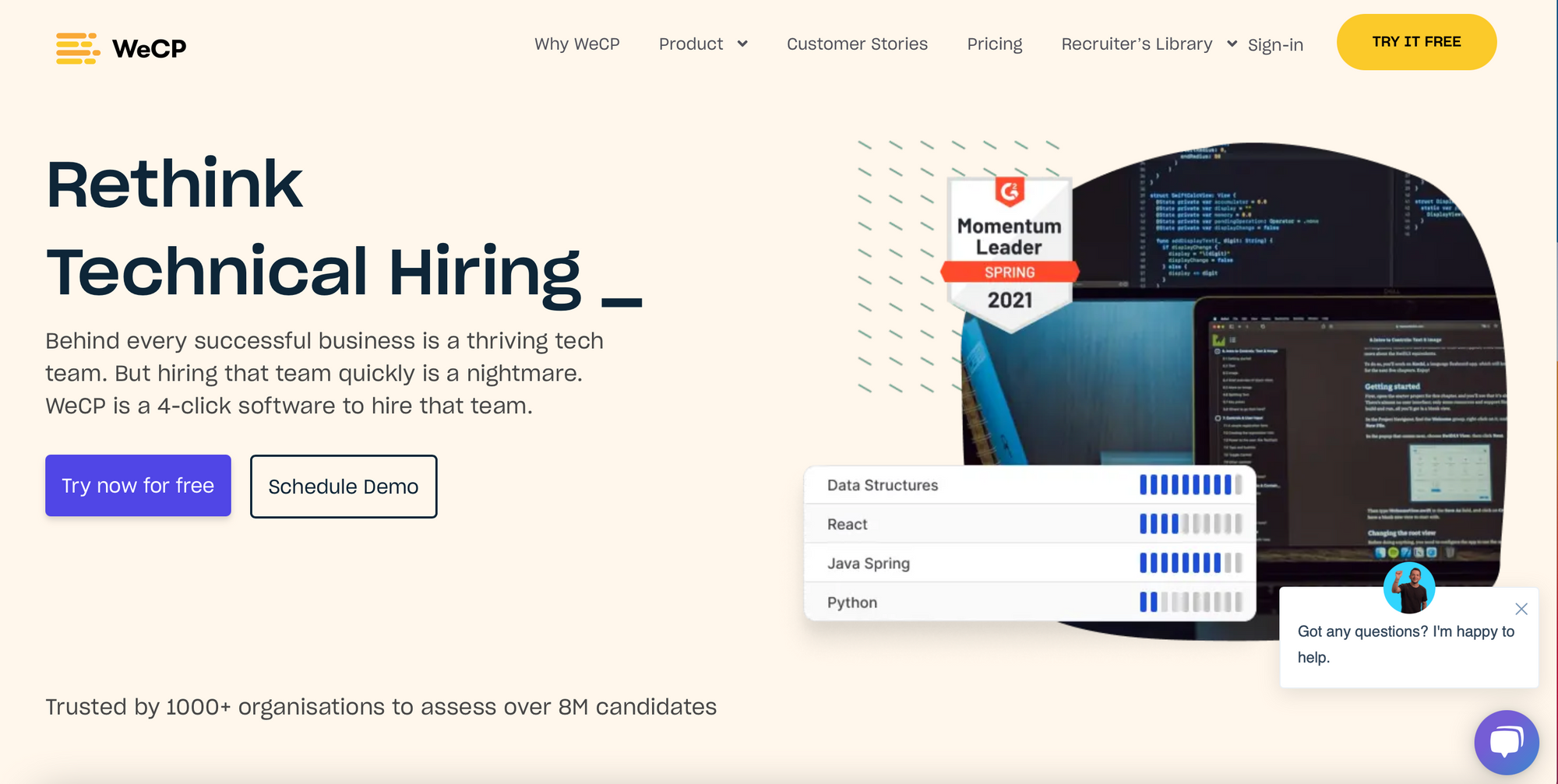
Who is it for?
- WeCP works for different types of businesses (SMEs, startups, and enterprises).
Pros
- A comprehensive tool for sourcing, testing, and interviewing talent.
Cons
- Not a lot of testing options, if testing is your primary priority.
28. Otomeyt
Founded: 2018
Free trial: Yes
Otomeyt is an AI-driven talent acquisition suite for empowering recruiters to source, assess, and onboard talent. The platform includes tools like cognitive tests, cognitive proficiency tests, and a video interview platform.
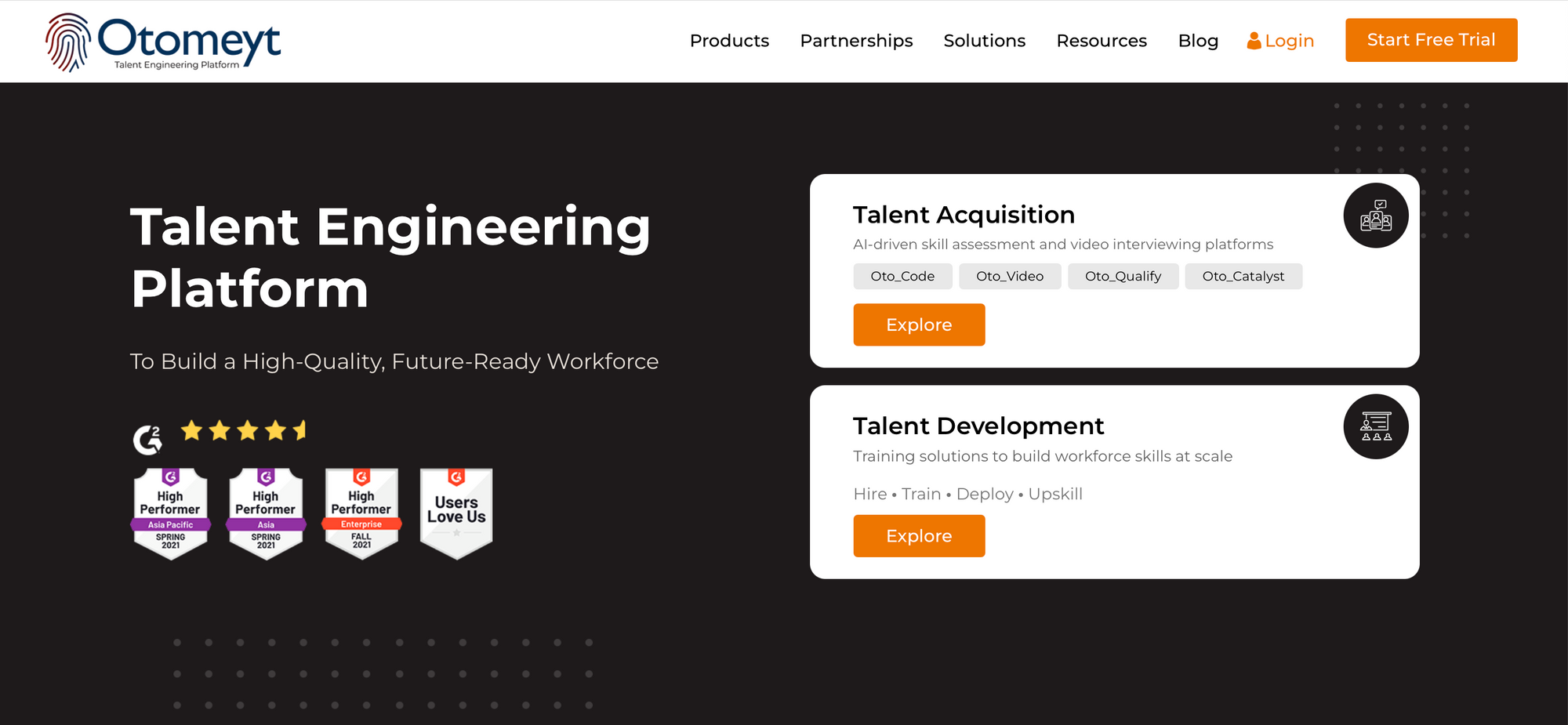
Who is it for?
- Otomeyt has enterprise-level and university and campus recruitment solutions.
Pros
- A good library of tests.
Cons
- Users often say that the platform lacks flexibility.
29. eSkill
Founded: 2003
Free trial: No
eSkill is a pre-hiring assessment platform that offers tools such as skill testing, video response questions, behavioral assessments, and more. The tools cater to different audiences, including technical roles.
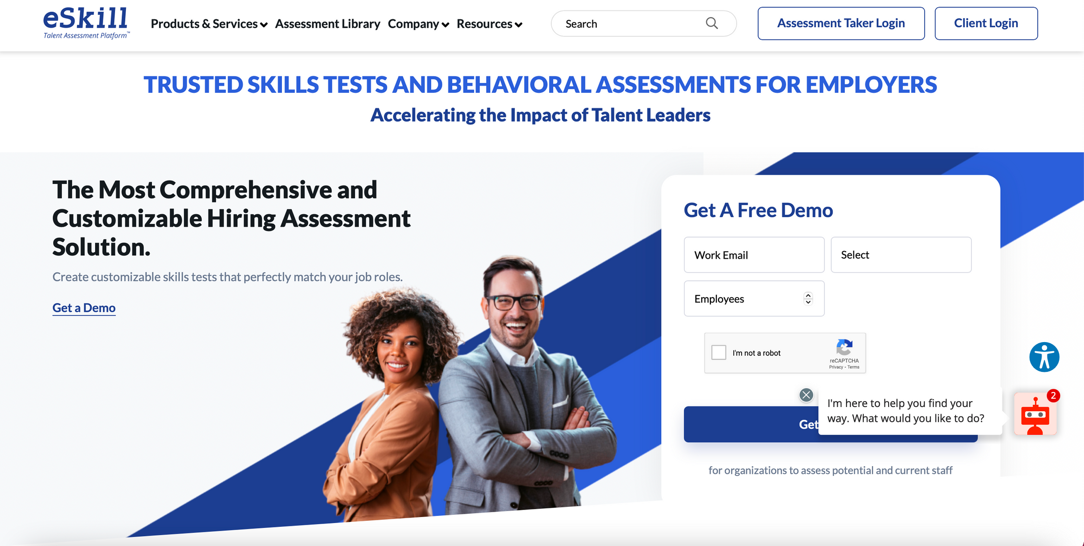
Who is it for?
- eSkill works for different types of businesses, including enterprise.
Pros
- Flexible solution with different tools to choose from.
Cons
- This is not a specialized assessment platform for technical roles.
30. Testlify
Founded: 2022
Free trial: Yes
Testlify is an AI-powered assessment tool that offers different types of tests, including programming, software skills, cognitive ability, and language tests. The company caters to different industries, including SaaS, retail, and finance.
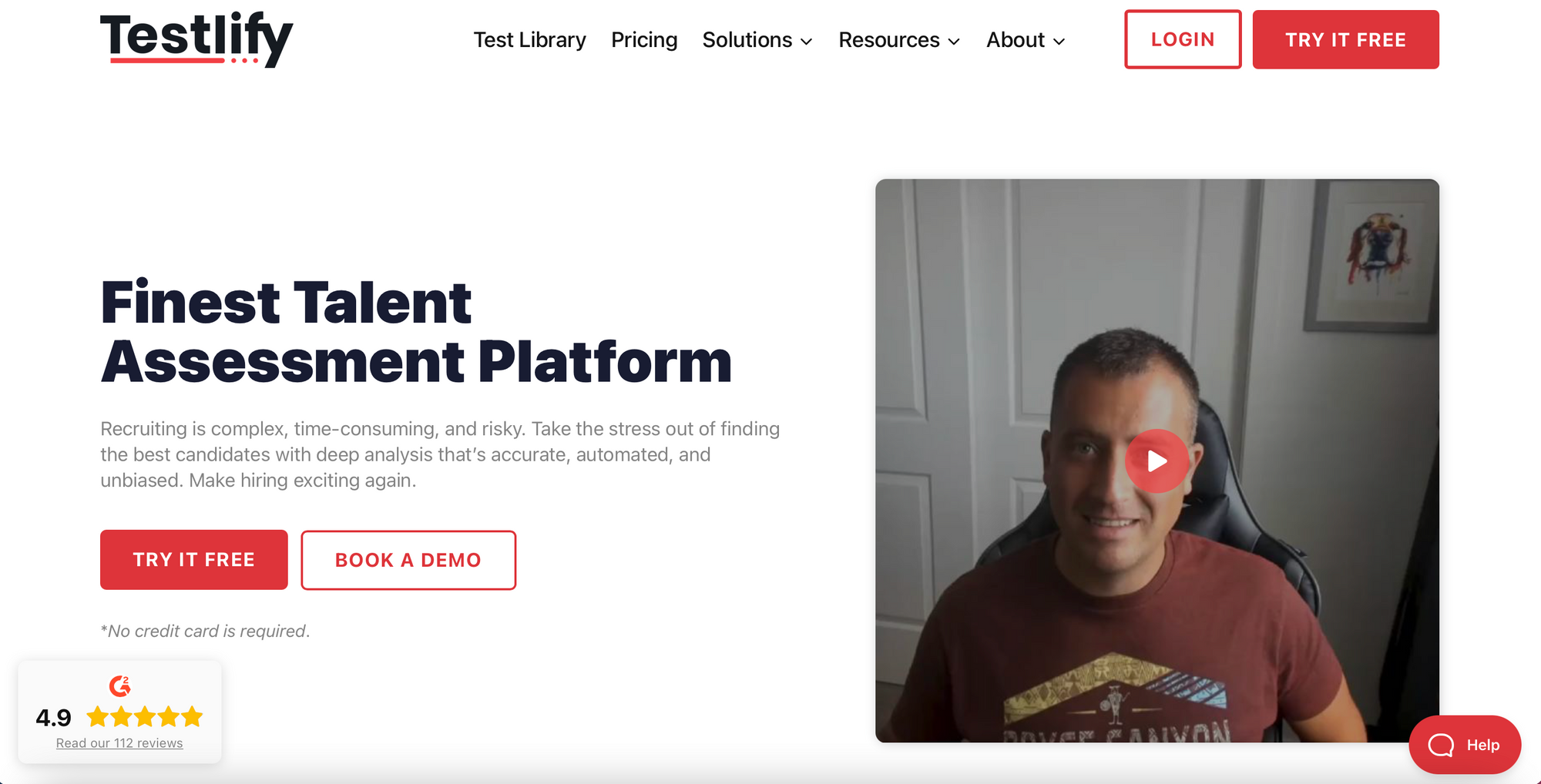
Who is it for?
- Testlify has solutions for smaller to bigger businesses (not necessarily enterprise-level solutions).
Pros
- Easy to use tool with a good test library.
Cons
- This is not a specialized assessment platform for technical roles.
How to use coding assessment tools for the best results
What’s the next step in assessing your candidates after you’ve found the perfect assessment platform for your needs?
You’ll likely want to get started using the platform in the right way and start sending out those invites. But skill assessments don’t always offer the best candidate experience, and developers aren’t that excited about going through hours of unpaid work without anything to show for it (see here and here).
You need a candidate-friendly process for administering assessments.
Avoid poorly executed coding challenges
Coding challenges that are poorly executed will quickly mean that you lose out on talent. But what does a bad coding challenge look like?
Simple: Challenges that are too long (coding challenges that last hours or even days) and have a clunky, anxiety-inducing interface that restricts candidates from performing their best.
And also challenges where the hiring team doesn’t offer any feedback.
Remember: Candidates spend their valuable time on your assignment. Show that you value it too by offering feedback on what they did well and what they can improve the next time around.
Using coding challenges in the right way
What, then, does a good coding challenge look like?
First, start by defining the evaluation criteria. You need to be clear on this before you ask developers to spend time on your challenge.
And second, create a coding challenge that is the right length. Three to four hours is sufficient -- not too long, but long enough for you to have something to evaluate.
Finally, spend some time on making sure that the experience of taking your assessment empowers candidates to demonstrate their skill and do their best work.
To read more about how to design a take-home coding challenge, read our guide here.
There you have it! Now that you have a better idea of what coding assessment tools are available to you in 2026, you can set off to make the best choice for your team. You also know how to get the most out of these platforms and what type of assessment tool to look out for.
Is your team looking for a take-home coding challenge tool?